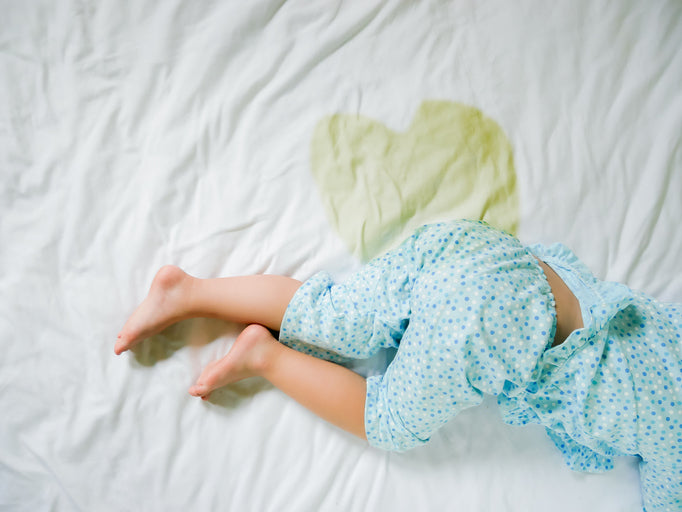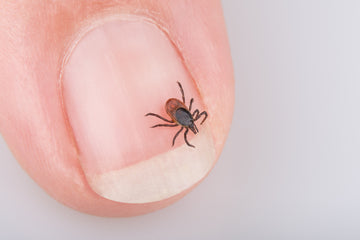Changing the Sheets: Why Does My Child Wet the Bed

Stripping the bed at 3:00am is not a fun task. I won’t lie, sometimes we just throw a towel down and all go back to sleep. But it gets old – FAST. It is frustrating, aggravating, and confusing… WHY is my child randomly wetting the bed?
I know that I’ve lost my cool in wee hours of the morning – and I’m sure you can relate, but we cannot blame our children. They are not wetting the bed intentionally. It is not the child’s fault for wetting the bed, and there may not be an obvious cause as to why it is happening. You may need more than an investment in pull-ups to get you through this.
Diet Linked to Bedwetting
“Nocturnal enuresis may be linked to dietary allergies that provoke bladder instability.”
According to Dr. Douglas N.Tietjen, M.D., and Douglas A.Husmann, M.D. from the Department of Urology at the Mayo Clinic, all of the patients in the study stopped bed-wetting when they began food-restricted diets, and the wetting re-occurred when the patients resumed regular diets. Wondering if your child’s diet is at fault? Do any of the following also plague him:- digestive problems
- protruding abdomen (bloated belly)
- skin rashes or hives
- eczema
- asthma
- stuffy, runny nose
- dark circles under the eyes
- hyperactivity
- night sweats
- red ears
- red cheeks
- bumps on the back of the arms
- frequent colds/illnesses
If you answered yes to two or more of these, food sensitivities (or allergies) may be to blame for the bedwetting. Typically, the foods your child reaches for the most are to blame, but not always. Talk to your doctor about IgE and IgG testing to find out specifically what’s triggering issues or follow an elimination diet like Feingold or GAPS. Make sure to keep a food journal to link any reactions to specific foods! Learn MORE.
Other Possible Bedwetting Causes
Enuresis is the loss of bladder control. Nocturnal Enuresis is known as “bed-wetting,” because it happens during the night while a child is sleeping. Approximately 5 to 7 million children wet the bed, with boys being affected more than girls. It’s important to know that researchers and doctors believe there is more than one underlying cause to bedwetting, but THAT THERE IS AN UNDERLYING CAUSE. You read that correctly. If your toddler or child begins wetting the bed after he had been completely potty-trained, there is something causing it. Most research has proven that bed-wetting isn't caused by drinking too much liquid before bedtime. It's not a psychological problem. It's not because the child is too lazy to get out of bed to go to the bathroom. According to Research, Possible Causes Include:- Genetics: Bedwetting tends to run in families
- Overactive Bladder Syndrome: When the muscles that control the bladder spasm and trigger urine to leak out.
- Small Bladder Capacity: A smaller bladder needs to be emptied more, but the child should wake to empty it.
- Medications: Certain medications cause frequent urination or deeper sleep, meaning the child will not wake up to go to the bathroom.
- Hormones: Low levels of the hormone Vasopressin (which regulates urine production) cause the kidneys to produce too much urine for the bladder to hold - OR not enough antidiuretic hormone; this hormone reduces the amount of urine made by the kidneys.
- Nervous System: The nerves attached to the bladder may not be fully developed. This can cause a weakened signal to the brain causing the child not to wake up.
- Fears: Being scared of the dark or other nighttime fears may keep your child in bed and scared to leave for the bathroom.
- Urinary Tract Infection
- Abnormalities in the urethral valves in boys or in the ureter in girls or boys
- Abnormalities in the spinal cord
- Constipation: If the bowels become blocked, it places pressure on the bladder and triggers bedwetting.
- Stimulating Beverages: sodas, teas, and caffeinated beverages may stimulate an increase in urine.

How to Help
- Do not voice your frustration or place blame on your child. You may cause the problem to get worse.
- Make sure your child uses the bathroom before bed.
- Keep a small potty-training potty next to his bed so he knows he has something close by to use if the bathroom is too far, the hall is too dark, or he’s too tired to walk that far.
- Keep the mattresses protected with waterproof covers. Go one step forward and add another waterproof layer on top of the fitted sheet that can be removed in the middle of the night without having to strip the entire bed.
- Chiropractic Care: Several studies show that manipulating and adjusting the spine can eliminate bedwetting.
- Behavior therapy: A treatment that doesn't use medicine.
- Motivational therapy: positive reinforcement and reward systems to help your child keep track of his progress.
- Behavior conditioning: This therapy uses an alarm. The alarm rings or vibrates when your child first begins to wet the bed. When the alarm goes off, it wakes your child. This gets him or her into the habit of waking up in the night to go to the bathroom.
- One kind of medicine helps the bladder hold more urine
- The other kind helps the kidneys make less urine.
Talk to your child’s doctor if bed-wetting occurs with daytime wetting and/or bowel problems. This may be a sign of a more serious problem.







